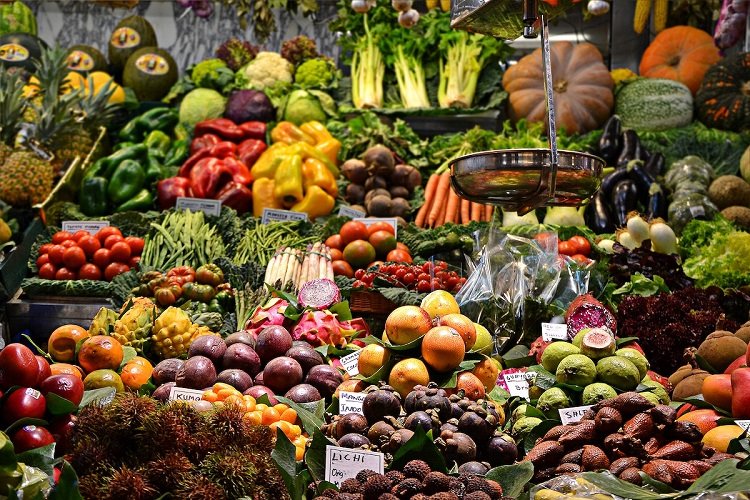In a world where kale chips reign supreme and cauliflower takes center stage as a versatile ingredient, there’s a growing movement that has replaced meaty main courses with vibrant plant-based alternatives. It’s a trend that has captured the attention of health enthusiasts, animal rights activists, and curious foodies alike. Welcome to the realm of plant-based nutrition – a journey towards embracing the benefits of a vegetarian or vegan diet. Whether you’re a firm believer in the power of leafy greens or simply intrigued by the idea of a plate brimming with colorful fruits and vegetables, prepare to explore the endless possibilities that lie within this culinary universe. Join us, as we wander down the flavorful path towards a compassionate and nourishing lifestyle.
The Power of Plant-Based Diets in Promoting Health and Wellness
Plant-based diets have been gaining popularity, and for good reason. Not only are they delicious and versatile, but they also offer a multitude of health benefits that can promote overall well-being. By focusing on consuming a variety of fruits, vegetables, whole grains, legumes, and nuts, individuals can harness the power of plant-based diets to nourish their bodies and enhance their physical and mental health.
One of the key advantages of plant-based diets is their ability to provide an abundance of essential nutrients. Fruits and vegetables, for example, are packed with vitamins, minerals, and antioxidants that support a strong immune system and help ward off diseases. Whole grains offer a rich source of fiber, promoting good digestion and preventing constipation. Legumes and nuts are excellent sources of plant-based protein, aiding in muscle growth and repair.
Additionally, the high level of fiber found in plant-based diets promotes a healthy gut microbiome. A balanced gut flora has been linked to reduced inflammation and improved digestion. Furthermore, this abundance of fiber can help individuals maintain a healthy weight, as it provides a feeling of fullness, reducing the temptation to overeat.
Lastly, plant-based diets have been associated with a lower risk of chronic conditions such as heart disease, type 2 diabetes, and certain types of cancer. This can be attributed to their lower levels of saturated fats and cholesterol compared to animal-based diets. By incorporating plant-based meals into our daily lives, we can proactively work towards preventing these illnesses and promoting lifelong health and wellness.

Exploring the Nutritional Benefits of a Vegetarian or Vegan Lifestyle
Adopting a vegetarian or vegan lifestyle goes beyond personal values or ethical choices; it also comes with a plethora of nutritional benefits that can enhance overall well-being. By ditching meat and embracing a plant-based diet, individuals can tap into a world of essential nutrients that are abundant in fruits, vegetables, whole grains, legumes, and nuts.
- Increased intake of vitamins and minerals: A vegetarian or vegan diet often leads to a higher consumption of important vitamins like Vitamin C, E, and folate, as well as minerals such as magnesium, potassium, and iron. These nutrients play vital roles in supporting the immune system, promoting healthy blood circulation, and preventing chronic diseases.
- Rich source of fiber: Plant-based diets are naturally high in dietary fiber, which aids in digestion, maintains bowel regularity, and promotes a healthy gut microbiome. Fiber also helps reduce the risk of heart disease, control blood sugar levels, and contribute to healthy weight management.
- Lower saturated fat and cholesterol: Animal products are typically rich in saturated fat and cholesterol, which are known to increase the risk of cardiovascular diseases. By adopting a vegetarian or vegan lifestyle, individuals can significantly reduce their intake of these harmful substances, promoting a healthier heart and overall cardiovascular health.
In addition to these key nutritional benefits, vegetarian or vegan diets are also associated with lower body mass index (BMI), reduced risk of obesity, and improved management of diabetes. It is important, however, to ensure a well-balanced and varied diet to meet the body’s nutritional needs, such as including sources of plant-based protein like tofu, tempeh, legumes, and quinoa.

The Role of Plant Proteins in Meeting Dietary Needs
Plant proteins play a crucial role in meeting our dietary needs and promoting overall health. With the increasing popularity of vegetarian and vegan lifestyles, understanding the benefits of plant-based proteins has become more important than ever. Let’s explore how these mighty nutrients contribute to a well-rounded diet:
Diverse sources of plant proteins:
- Legumes: beans, lentils, chickpeas, and peas are excellent sources of plant-based protein. They are also rich in fiber, vitamins, and minerals.
- Nuts and Seeds: almonds, walnuts, chia seeds, and hemp seeds are packed with protein, healthy fats, and antioxidants. They can be easily incorporated into various recipes or enjoyed as a snack.
- Grains: whole grains like quinoa, brown rice, and oats not only provide a good amount of protein but also offer essential nutrients and dietary fiber.
- Soy Products: tofu, tempeh, and edamame are versatile sources of protein commonly used in vegetarian and vegan recipes. They are also rich in iron and calcium.
The nutritional benefits of plant proteins:
In addition to fulfilling our protein needs, plant proteins offer numerous health benefits:
- Lower risk of chronic diseases: consuming plant proteins as part of a balanced diet has been associated with a reduced risk of heart disease, certain cancers, and type 2 diabetes.
- Rich in essential amino acids: although individual plant proteins may not contain all essential amino acids, consuming a variety of plant-based protein sources ensures the body receives a complete amino acid profile.
- High in fiber: plant proteins are often accompanied by dietary fiber, aiding digestion, promoting satiety, and supporting a healthy gut.
- Environmental sustainability: replacing animal proteins with plant proteins helps reduce greenhouse gas emissions, land use, and water consumption, contributing to a more sustainable future.
Incorporating plant proteins into your diet:
Luckily, there are numerous creative and delicious ways to incorporate plant proteins into your daily meals:
- Experiment with different legumes, grains, and nuts to create flavorful salads, grain bowls, and stir-fries.
- Try plant-based meat alternatives made from soy, seitan, or pea protein, which closely mimic the taste and texture of animal-based products.
- Blend protein-rich smoothies using plant-based protein powders, fruits, vegetables, and nut milk for a quick and convenient meal or snack.
- Explore recipes for plant-based burgers, tacos, and curries that utilize ingredients like tofu, tempeh, or seitan for a satisfying and protein-packed meal.
Your dietary needs can be met by embracing the incredible variety and nutritional benefits of plant proteins, while also promoting a sustainable and environmentally friendly lifestyle.

Harnessing the Vitality of Fruits, Vegetables, and Whole Grains for Optimal Nutrition
Eating a colorful variety of fruits, vegetables, and whole grains is not only essential for a well-balanced diet, but it also offers a multitude of benefits that boost your overall health and wellbeing. By harnessing the vitality of these natural powerhouses, you are providing your body with a treasure trove of essential nutrients, antioxidants, and fiber that promote optimal nutrition.
Fruits are nature’s sweet delights, providing us with a rich source of vitamins, minerals, and fiber. The vibrant colors of fruits indicate the presence of antioxidants, which help fight off harmful free radicals in our bodies. From the juicy oranges bursting with vitamin C to the antioxidant-rich blueberries that support brain health, incorporating a variety of fruits in your diet can help strengthen your immune system, improve digestion, and contribute to glowing skin.
Vegetables are true nutritional powerhouses and should take center stage on every plate. Whether leafy greens like spinach and kale, or colorful vegetables like bell peppers and carrots, they are packed with an array of essential vitamins, minerals, and phytochemicals. Rich in fiber, they aid in digestion, provide satiety, and promote a healthy gut. By incorporating a range of vegetables, you can enjoy diverse flavors, textures, and a rainbow of nutrients that help maintain a strong immune system and support overall well-being.
Whole grains are the wholesome foundation for sustained energy and nourishment. Unlike refined grains, whole grains retain all parts of the grain, including the bran, germ, and endosperm. This means they contain more fiber, vitamins, minerals, and antioxidants. Wheat, oats, quinoa, and brown rice are just a few examples of whole grains that can provide essential nutrients, stabilize blood sugar levels, support heart health, and promote healthy weight management. Incorporating these grains in your meals can help you feel fuller for longer, maintain steady energy levels, and reduce the risk of chronic diseases.

Practical Tips for a Balanced Plant-Based Diet
Eating a plant-based diet can be a delightful and healthy experience, both for you and the planet. To ensure you are getting all the essential nutrients your body needs, here are some practical tips to keep in mind while embarking on your plant-based journey:
Variety is Key
- Include a wide range of fruits and vegetables in your meal plan to obtain a diverse array of nutrients and phytochemicals.
- Experiment with different colors, flavors, and textures to make your meals exciting and enjoyable.
- Try incorporating leafy greens, such as kale, spinach, or Swiss chard, for an excellent source of essential vitamins and minerals.
Mind Your Macronutrients
- Ensure that your plant-based diet is well-balanced with macronutrients like carbohydrates, proteins, and healthy fats.
- Opt for whole grains like quinoa, brown rice, or oats to get sufficient complex carbohydrates.
- Legumes such as lentils, chickpeas, and beans are excellent sources of protein and fiber.
- Incorporate healthy fats found in avocados, nuts, and seeds to support brain health and aid nutrient absorption.
Don’t Forget Your Nutritional Powerhouses
- Include plant-based superfoods like chia seeds, flaxseeds, and hemp seeds in your diet to boost omega-3 fatty acids, fiber, and protein intake.
- Consider adding fermented foods like sauerkraut or miso to promote a healthy gut microbiome.
- Don’t overlook calcium-rich plant sources like fortified non-dairy milks, tofu, and leafy greens to maintain strong bones.
- Fortify your diet with vitamin B12, commonly found in nutritional yeast or fortified plant-based milk alternatives, as it is mainly found in animal products.
Remember, making mindful choices about the foods you consume is the key to maintaining a balanced plant-based diet. By including a variety of nutrient-dense ingredients and ensuring you are meeting your macronutrient needs, you can thrive on a plant-based lifestyle while enjoying all the health benefits it has to offer.
Key Takeaways
As we bid adieu to this exploration of plant-based nutrition, we hope you feel inspired, enlightened, and empowered to embark on a journey towards a vegetarian or vegan diet. It is not merely a choice to eliminate animal products from your plate; it is a transformative lifestyle that transcends boundaries, nurturing not only your body but also the planet we call home.
By embracing the countless benefits of this plant-powered way of life, you become an ambassador for change, fostering a harmonious coexistence between nutrition and sustainability. The art of nourishing your body with the vibrant tapestry of plant-based foods weaves seamlessly into a collective tapestry, uniting individuals striving for a better world.
From the crisp crunch of fresh greens to the succulent sweetness of sun-ripened fruits, each bite becomes a testament to the intricate beauty of nature’s offerings. Fueling your body with the vitamins, minerals, and antioxidants whispered by these botanical wonders, you unlock a reservoir of vitality, clarity, and physical well-being that has long been awaiting your embrace.
Moreover, as you delve into the rich depths of a vegetarian or vegan diet, you discover the immense capacity for culinary creativity it unveils. Prepare to be enchanted by the symphony of flavors dancing upon your taste buds, as you explore the versatility of plant proteins and the myriad of dishes that unfold.
But beyond personal health and gastronomic delights, a plant-based diet is an act of compassion. It is a heartfelt acknowledgement of the interconnectedness of all life forms. By adopting this path, you extend your empathy towards animals, recognizing their agency and granting them the freedom they inherently deserve. You become a guardian of their welfare, embracing a philosophy that fosters a gentler, more equitable world.
So, as we conclude this exploration, let us part ways with a shared sense of purpose. Let us be united in our commitment to explore the infinite possibilities that lie within plant-based nutrition. Let us nourish our bodies, the planet, and our collective consciousness. Together, we can sow the seeds of a future brimming with health, sustainability, and compassion. Until we meet again on this greener path, embrace the power of plants and continue to flourish with their abundance.

